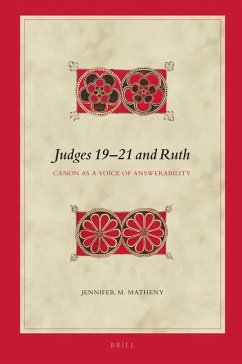Previous scholarship hints at the connection between Judges 19-21 and Ruth (as set in dialogue), but there has yet to be a study to articulate this relationship. Through a Bakhtinian-canonical perspective, a comparative analysis of these texts unveils intertextual correlations. Lexical and thematic connections include shared idioms, contrasting themes of חרם ("ban") andחסד ("loving-kindness," "covenant-faithfulness"), silence and speech, abuse and potential for abuse, gendered violence and feminine agency. This case-study reveals that Ruth, as a text and as a woman, embodies a voice of answerability to the silenced and abused women in Judges 19-21
Bitte wählen Sie Ihr Anliegen aus.
Rechnungen
Retourenschein anfordern
Bestellstatus
Storno

